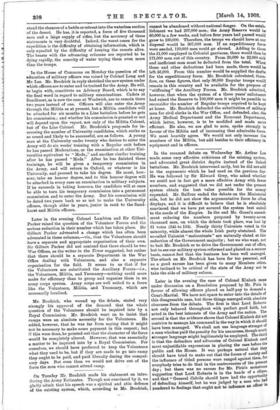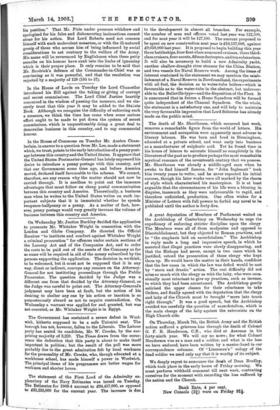Later in the evening the case of Colonel Kinloch came
under discussion on a Resolution proposed by Mr. Pixie in favour of allowing officers placed on half-pay to demand a Court-Martial. We have not space to enter into the details of this disagreeable case, but three things emerged with absolute clearness from the debate. The first is that Lord Roberts not only behaved throughout with perfect good faith, but acted in the best interests of the Army and the nation. The second is that the evidence shows that Colonel Kinloch did not contrive to manage his command in the way in which it should have been managed. We shall not use language stronger of a man who has paid the penalty for his unsuccess, though much stronger language might legitimately be employed. The third is that the defenders and advocates of Colonel Kinloch used most unjustifiable expressions in placing the case before the public and the House. It was perhaps natural that they should have tried to make out that the forces of society and the influence of titled persons were ranged against them, for everybody tries to do that in the controversies of the present day ; but there was no excuse for Mr. Pine's monstrous suggestion that Lord Roberts is in the hands of a clique, and that "General Colvile should have had the opportunity of defending himself, but he was judged by a mail who had
pandered to feelings that ought not to influence an officer in his position." That Mr. Pixie under pressure withdrew and apologised for his false and dishonouring insinuations cannot atone for his action. But Lord Roberts need not concern himself with such malevolent nonsense, or with the ill-natured gossip of those who accuse him of being influenced by social considerations to act contrary to the welfare of the Army. His name will be reverenced by Englishmen when these petty assaults on his honour have sunk into the limbo of ignominy which is their proper place. It only remains to be said that Mr. Brothick's defence of the Commander-in-Chief was as convincing as it was powerful, and that the resolution was rejected by a majority of 128 (185 to 57).











































 Previous page
Previous page